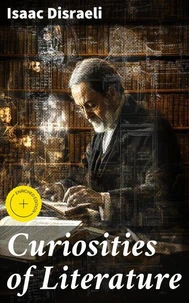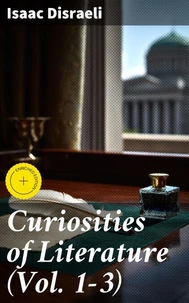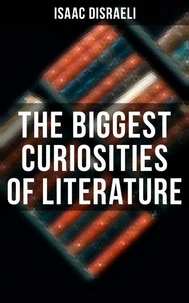Literary Character of Men of Genius. Drawn from Their Own Feelings and Confessions
Par : ,Formats :
Disponible dans votre compte client Decitre ou Furet du Nord dès validation de votre commande. Le format ePub est :
- Compatible avec une lecture sur My Vivlio (smartphone, tablette, ordinateur)
- Compatible avec une lecture sur liseuses Vivlio
- Pour les liseuses autres que Vivlio, vous devez utiliser le logiciel Adobe Digital Edition. Non compatible avec la lecture sur les liseuses Kindle, Remarkable et Sony
 , qui est-ce ?
, qui est-ce ?Notre partenaire de plateforme de lecture numérique où vous retrouverez l'ensemble de vos ebooks gratuitement
Pour en savoir plus sur nos ebooks, consultez notre aide en ligne ici
- Nombre de pages493
- FormatePub
- ISBN859-65--4736390-3
- EAN8596547363903
- Date de parution16/09/2022
- Protection num.Digital Watermarking
- Taille942 Ko
- Infos supplémentairesepub
- ÉditeurDIGICAT
Résumé
In "Literary Character of Men of Genius, " Isaac Disraeli explores the intricate relationship between literary creativity and personality, offering a rich tapestry of insights into the minds of notable authors and thinkers. Through an engaging narrative style, he not only examines the traits common among literary figures but also juxtaposes their personal lives with their artistic outputs, highlighting how genius is often accompanied by eccentricity and emotional depth.
The book reflects the Romantic ethos of the early 19th century, emphasizing the notion of the artist as an individual who dwells on the margins of society, a theme that was becoming increasingly prominent as literature was evolving into a vehicle for personal expression. Isaac Disraeli, a polymath and literary figure himself, was deeply embedded in the cultural currents of his time. As the father of the more famous Benjamin Disraeli, Isaac's eclectic interests spanned history, literature, and intellectual pursuits, enabling him to draw upon a wealth of knowledge to craft this work.
His personal experiences and observations of contemporaneous writers likely influenced his desire to probe the complexities of literary genius, highlighting the nuanced interplay between an author's life and their creative legacy. This book is recommended for scholars and literature enthusiasts alike, as it provides a profound exploration of the artistic psyche that remains relevant today. Disraeli's analytical yet accessible prose invites readers to reflect on the nature of creativity and the societal roles of writers, making it a timeless addition to the understanding of literary studies.
The book reflects the Romantic ethos of the early 19th century, emphasizing the notion of the artist as an individual who dwells on the margins of society, a theme that was becoming increasingly prominent as literature was evolving into a vehicle for personal expression. Isaac Disraeli, a polymath and literary figure himself, was deeply embedded in the cultural currents of his time. As the father of the more famous Benjamin Disraeli, Isaac's eclectic interests spanned history, literature, and intellectual pursuits, enabling him to draw upon a wealth of knowledge to craft this work.
His personal experiences and observations of contemporaneous writers likely influenced his desire to probe the complexities of literary genius, highlighting the nuanced interplay between an author's life and their creative legacy. This book is recommended for scholars and literature enthusiasts alike, as it provides a profound exploration of the artistic psyche that remains relevant today. Disraeli's analytical yet accessible prose invites readers to reflect on the nature of creativity and the societal roles of writers, making it a timeless addition to the understanding of literary studies.
In "Literary Character of Men of Genius, " Isaac Disraeli explores the intricate relationship between literary creativity and personality, offering a rich tapestry of insights into the minds of notable authors and thinkers. Through an engaging narrative style, he not only examines the traits common among literary figures but also juxtaposes their personal lives with their artistic outputs, highlighting how genius is often accompanied by eccentricity and emotional depth.
The book reflects the Romantic ethos of the early 19th century, emphasizing the notion of the artist as an individual who dwells on the margins of society, a theme that was becoming increasingly prominent as literature was evolving into a vehicle for personal expression. Isaac Disraeli, a polymath and literary figure himself, was deeply embedded in the cultural currents of his time. As the father of the more famous Benjamin Disraeli, Isaac's eclectic interests spanned history, literature, and intellectual pursuits, enabling him to draw upon a wealth of knowledge to craft this work.
His personal experiences and observations of contemporaneous writers likely influenced his desire to probe the complexities of literary genius, highlighting the nuanced interplay between an author's life and their creative legacy. This book is recommended for scholars and literature enthusiasts alike, as it provides a profound exploration of the artistic psyche that remains relevant today. Disraeli's analytical yet accessible prose invites readers to reflect on the nature of creativity and the societal roles of writers, making it a timeless addition to the understanding of literary studies.
The book reflects the Romantic ethos of the early 19th century, emphasizing the notion of the artist as an individual who dwells on the margins of society, a theme that was becoming increasingly prominent as literature was evolving into a vehicle for personal expression. Isaac Disraeli, a polymath and literary figure himself, was deeply embedded in the cultural currents of his time. As the father of the more famous Benjamin Disraeli, Isaac's eclectic interests spanned history, literature, and intellectual pursuits, enabling him to draw upon a wealth of knowledge to craft this work.
His personal experiences and observations of contemporaneous writers likely influenced his desire to probe the complexities of literary genius, highlighting the nuanced interplay between an author's life and their creative legacy. This book is recommended for scholars and literature enthusiasts alike, as it provides a profound exploration of the artistic psyche that remains relevant today. Disraeli's analytical yet accessible prose invites readers to reflect on the nature of creativity and the societal roles of writers, making it a timeless addition to the understanding of literary studies.






